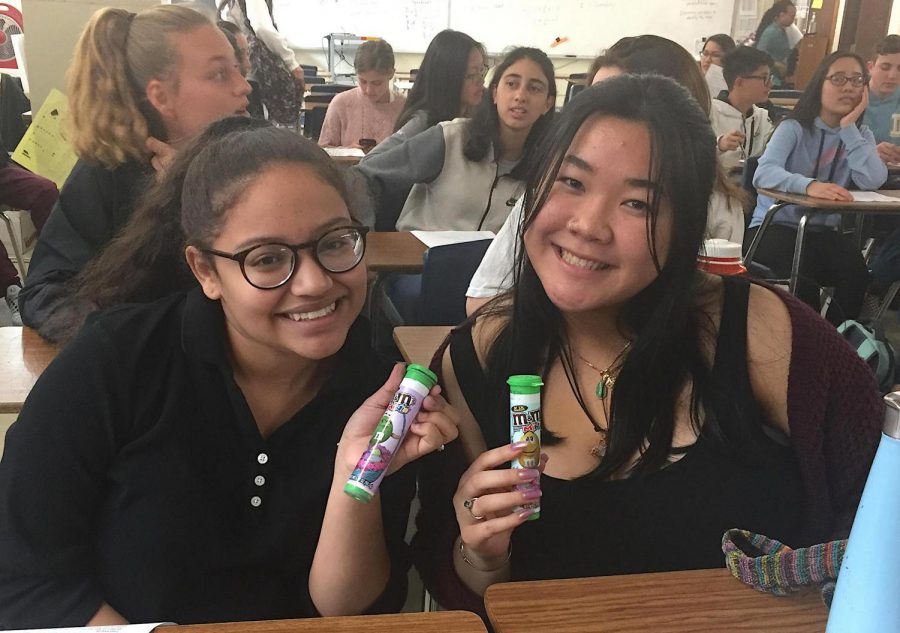Key Club taps into need for potable water
Members raise money to help Thirst Project supply water
DHS Key Club members Audrey Hinh, left, and Penelope Peralta are happy with the club’s fund-raising efforts for the Thirst Project.
May 3, 2019
Every morning before school, DHS students go through their morning routine — using the restroom, brushing their teeth, taking a shower.
They drink from the water fountains throughout the day and run faucets without wondering when will be the next time they’ll have access to fresh water.
This privilege is unfortunately out of reach for the 2.1 billion people worldwide who lack access to a safe and reliable source of water. It is estimated by the World Health Organization that 842,000 of them die each year from diarrhea as a result.
According to WHO, 263 million of them have to spend more than half an hour gathering water every day, many of them children who have to sacrifice and education to do so.
The harsh reality of this global water crisis was realized by Thirst Project founder Seth Maxwell over a coffee date in 2008, when he then resolved to take action. He gathered seven of his college friends to raise awareness and money in his community to fund his first rehabilitated freshwater well.
From there, Maxwell founded the Thirst Project to further raise awareness, this time targeting students in educating schools nationwide on the water crisis and how to help. Seven years later, the Thirst Project has raised more than $8 million and provided more than 280,000 people a safe water source.
When visiting the Key Club International conference last fall, DHS Key Club secretary Angela Saquinaula, junior, took particular interest in the Thirst Project, a long time partner of Key Club International.
“Initially, we were interested because it’s a pressing issue that affects kids like us,” Sanquinaula explained. “While other great organizations like UNICEF were there, the Thirst Project exposed a challenge devastating the world that we simply had to help.”
From there, the Key Club has cultivated numerous events to aid the Thirst Project in raising money. Earlier this year, the Key Club hosted a pancake breakfast at Applebee’s. The club also sold carnations to students and faculty on Valentine’s Day.
Despite the hard work involved, the Key Club are satisfied by their efforts. “We’ve worked tirelessly this year to help the organization,” said Key Club Project Chair Alenna Jacob, sophomore. “But it’s still been really enjoyable.”
The funds contributed to the Thirst Project will be used to build a well in Eswatini, formerly Swaziland, a water-scarce nation. “The funds from our Key Club will be pooled in with other Key Clubs’ funds nationwide,” Key Club advisor Carol Glintenkamp explained.
However, the Key Club’s partnership with the Thirst Project extends beyond mere fundraising. One of the Thirst Project’s objectives is to educate students nationwide on the water crisis, and so the Key Club hosted a Thirst Project presentation during FLEX on April 11 for sophomores.
Thirst Project Road Warrior Hannah Capace — a college intern in her second semester with the organization — presented a video showcasing the severity of water scarcity in nations such as Eswatini.
Appealing to student sympathies, the sophomore class gave $343 to contribute at the end of the block. “Danbury High School gave the most amount of money out of the 80 high schools I have presented at,” Capace said. “It truly was an amazing experience. The Thirst Project wouldn’t be what it is today without students like those at Danbury High.”
More than $2,000 has been raised in the DHS Key Club’s fundraising efforts so far — and members don’t plan on stopping anytime soon. They are currently collecting $20 worth of quarters in mini M&M containers to contribute to the efforts.
“This is another measure to add to our efforts. Not a penny gets wasted. We even used the leftover M&Ms to bake cookies for a bake sale, where the funds will also go to the Thirst Project,” explained sophomore Audrey Hinh.
Overall, the club has considered their efforts a “worthy success,” said Glintenkamp, a school social worker.
The Thirst Project has helped more than 367,000 people in 13 countries. With the help of Danbury High, the Thirst Project will help save thousands of more people in another nation.
“As citizens, it’s our responsibility to help those in need,” explained sophomore Penelope Peralta. “I think it’s remarkable that we get to make such a major impact right now.”
If you wish to donate to the Thirst Project, please contact Glintenkamp for details.





















